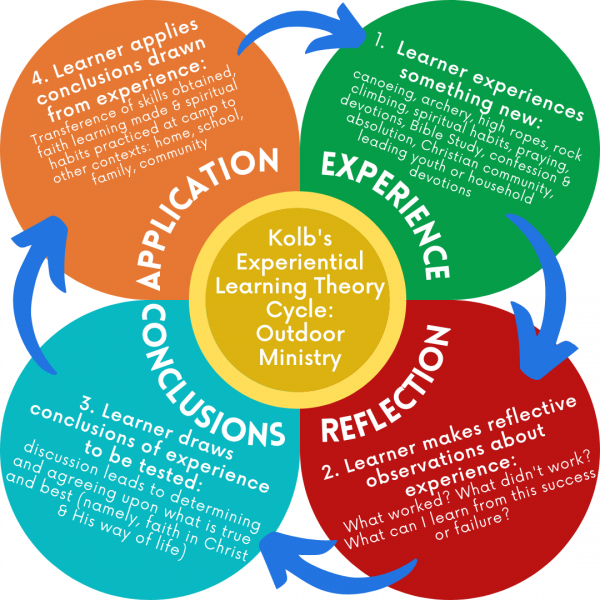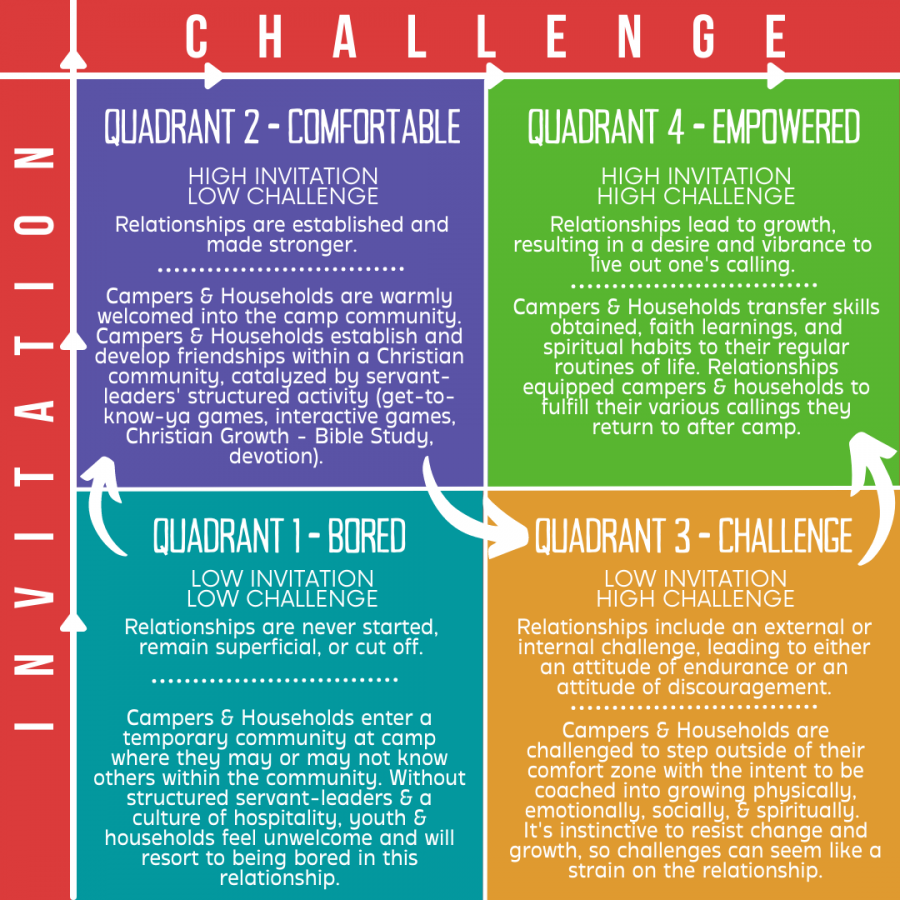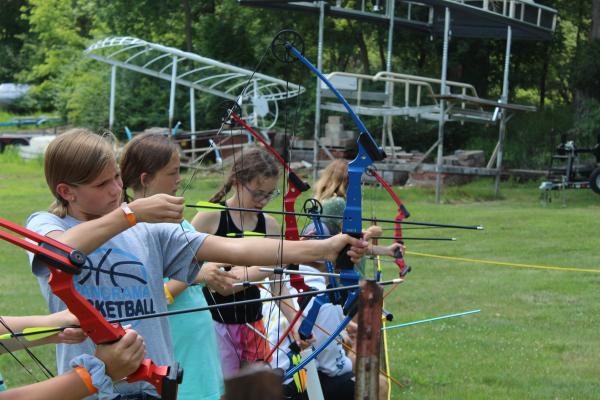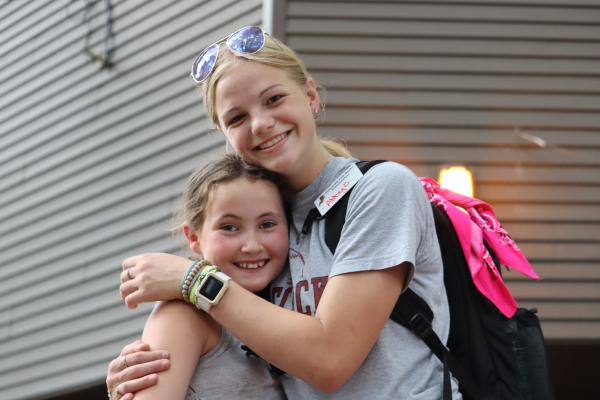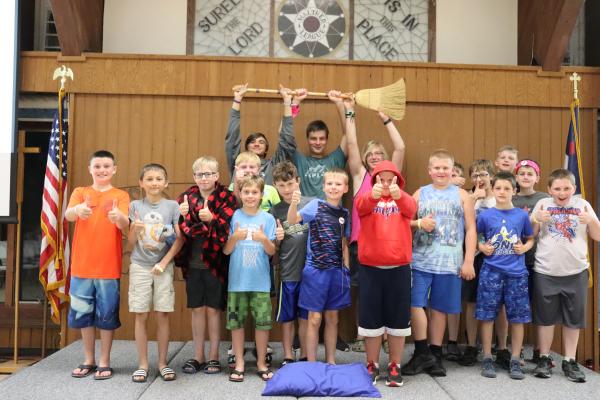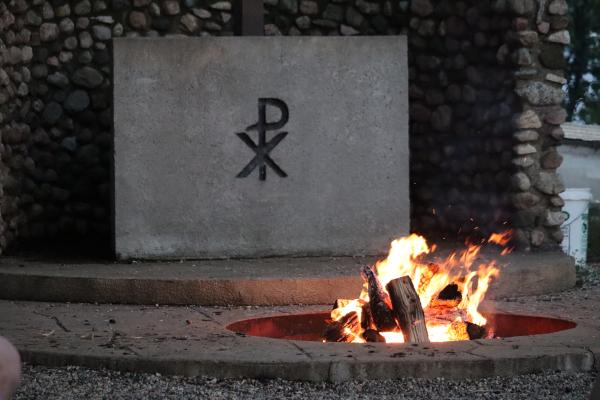A week of Outdoor Ministry is much more than a summer week of fun, recreation, and a vacation from the routines of regular, daily life. Outdoor Ministry provides campers, households, counselors, and summer staff with perhaps the most effective opportunity to engage in discipleship– learning and practicing the faith in Christ. In 2003, the Christian Camp and Conference Association defined Christian camping – Outdoor Ministry – as ‘an experience within a temporary community using the outdoor setting and trained leaders to meet spiritual objectives.” The following is an examination of each of the elements in this definition to assist in clarifying why outdoor ministry is an essential instrument to carrying out Christ’s mission to make disciples of all nations (Matthew 28:19-20).
An Experience
An experience at camp is a full immersion experience. It consists of a community that lives, eats, and breathes together. Involvement is inescapable, allowing for the most effective method of learning: experiential learning. In experiential learning, the learner experiences first, then reflects upon that experience, makes conclusions, and applies those conclusions to new situations, contexts, or problems (from David Kolb’s Experiential Learning Theory). The aim for experiential learning at camp is transference of discovery made at camp to other contexts – home, school, family, community.
Experiential learning occurs both formally and informally at camp. Formally, we engage in activities such as devotions, messages, sermons, spiritual conversations, and Christian Growth. We experience the Holy Spirit moving IN us and THROUGH us as we regularly hear the life-giving Word of God. Romans 10:17 reveals God’s means of the Holy Spirit working IN us through devotions, Christian Growth, and spiritual conversations: “Faith comes from hearing, and hearing through the Word of Christ.” Romans 12:2 reveals the transformative experience we have as the Holy Spirit works THROUGH us: “Do not be conformed to this world, but be transformed by the renewal of your mind, that by testing you may discern what is the will of God.” Concepts about the faith that may be difficult to grasp in a classroom, Sunday School room, or confirmation may come alive as the faith is taught and practiced immediately as Christian life is lived together at camp. Then these concepts, after being taught, practiced, and applied, are aimed to be transferred into participants’ regular, daily contexts.
Informally, participants at camp simply live life together. As a result, the natural events of living life together arise. Conflicts, celebrations, mentorships, experiences outside of one’s comfort zone, and many other experiences allow an individual to grow physically, emotionally, and spiritually. Experiential learning compels participants to face risks and make meaningful contributions to the group. Every camper’s personal risks and contributions look different. Counselors, leaders, and parents accept the calling to challenge each camper based on their individual needs to face risks and make meaningful contributions. By providing a safe, supportive environment where campers & households are invited to be challenged, growth is stimulated. From the moment a guest enters camp’s grounds, the hoped-for outcome is that they will have grown to some capacity by the time they leave. Seasonal summer staff and counselors are an essential part to campers’ and households’ physical, emotional, and spiritual development during their time at camp.
Temporary Community
Every permanent community contains a temporary community within it. School bodies are made up of several temporary, semester-long classrooms. Your church is a temporary community within the permanent community of the body of Christ. During the summer, camps have several week-long temporary communities, arranged by the full time staff, seasonal summer staff, and volunteers for the safety, support, and development of the campers and guests who will enter these temporary communities.
Temporary communities facilitate learning and change by producing social crises and reducing barriers to change. When you enter a new community, there are many social crises you experience. Do I risk becoming close with others, or distance myself from them? Do I accept and affirm others, or do I reject and discount them? Do I join the group’s shared values, or do I hold on to my personal values? A new environment shakes any preceding grounds of security until a group develops cohesion – expectations / camp rules – which gives you a new sense of security. With a new-found security and identity in this community, barriers that would ordinarily keep you from growth – lack of trust, rejection of others, conflicting personal values – are diminished, if not eliminated. It becomes so much easier to care about Christ when the norm of this community is to care about Him and what His Word says.
The beauty of a temporary community is the construction of it and the modeled norms in the community. Two essential vehicles to growth of any community are intentional invitation (relationship) and intentional challenge (transformation). This matrix to the right can be used to describe the state of a relationship or group. Our goal at camp is to guide campers and households toward the empowered quadrant, where they are challenged to consider their identity in Christ and be empowered to carry out the purpose that Christ has given them – to make disciples of all nations. Throughout the week, campers and households may be in constant transition between each quadrant, which is actually healthy for their development. However, there is danger in keeping the state of a relationship or group in one quadrant as it can stifle growth and development. There are structured times where we challenge campers in their faith (devotions and Bible Studies). There are structured times where we challenge campers in their skills (crafts, canoeing, games, sports). Campers respond to invitations and challenges differently. Some may defer invitations to empowerment and remain in their comfortable culture. Some campers may defer your challenge to be empowered and feel stressed by it (i.e. teaching a camper how to canoe and they just can’t do it!). At camp, we prepare counselors, staff, and volunteers to individualize their relationships with campers and households in order to calibrate an apporpiate balance of intentional invitation and challenge with the intent of developing campers and households in the faith.
Outdoor Setting
On average, kids ages 8-18 spend nearly 7.5 hours in front of a screen for entertainment each day, 4.5 of which is spent from streaming services or TV! How many hours during a regular week do you think you spend in front of a screen? We’re all captive to our devices. The device we were entrusted to master for the sake of Christ’s kingdom often masters us. Camp offers the opportunity to disconnect from screens and reconnect to God, the relationships He’s placed in your life, and your purpose in this world. A healthy retreat away from these controlling devices can spark creativity, intentionality of how you manage these devices, and a renewed appreciation for mere presence.
Trained Leaders
Trained Leaders
Meet Spiritual Objectives
Matthew 28:19-20: “Therefore, go, and make disciples of all nations, baptizing them in the name of the Father and of the Son and of the Holy Spirit, and teaching them to observe all that I have commanded you. And behold, I am with you always, to the end of the age.”
Outdoor Ministry is a seed-planting ministry. It serves as an outreach to campers and guests who are not in the faith in Christ by proclaiming the Gospel of Jesus Christ, (sometimes) baptizing them in the name of the Father, Son, and Holy Spirit, teaching in clarity the narrative of Scripture, and teaching ‘all that [God] has commanded. The experiential immersion of outdoor ministry encourages organic conversations to happen as life is lived together 24/7. From a trusted relationship, conversations between a camper or guest outside the faith and a Christian may lead toward their established belief in Christ.
Outdoor Ministry is also a seed-nurturing ministry. It provides opportunity for discipleship – the knowledge of God’s will, spiritual wisdom and discernment, and practical understanding and application (Colossians 1:9). Outdoor ministry strives to provide opportunities to practice ‘all that [God] has commanded’ in a temporary context, removed from regular, daily life with the intention that those practices would be transferred to their regular, daily life.
With this in mind, the short spiritual objective of camps of outdoor ministry, and ultimately the Church is ‘make disciples.’ Camp Okoboji is an extension and supplemental ministry to the mission of the Lutheran Church – Missouri Synod congregations in Iowa District – West. An established ministry of the Church, it is our intent to strive toward excellence in proclaiming and teaching the Gospel to all guests.

